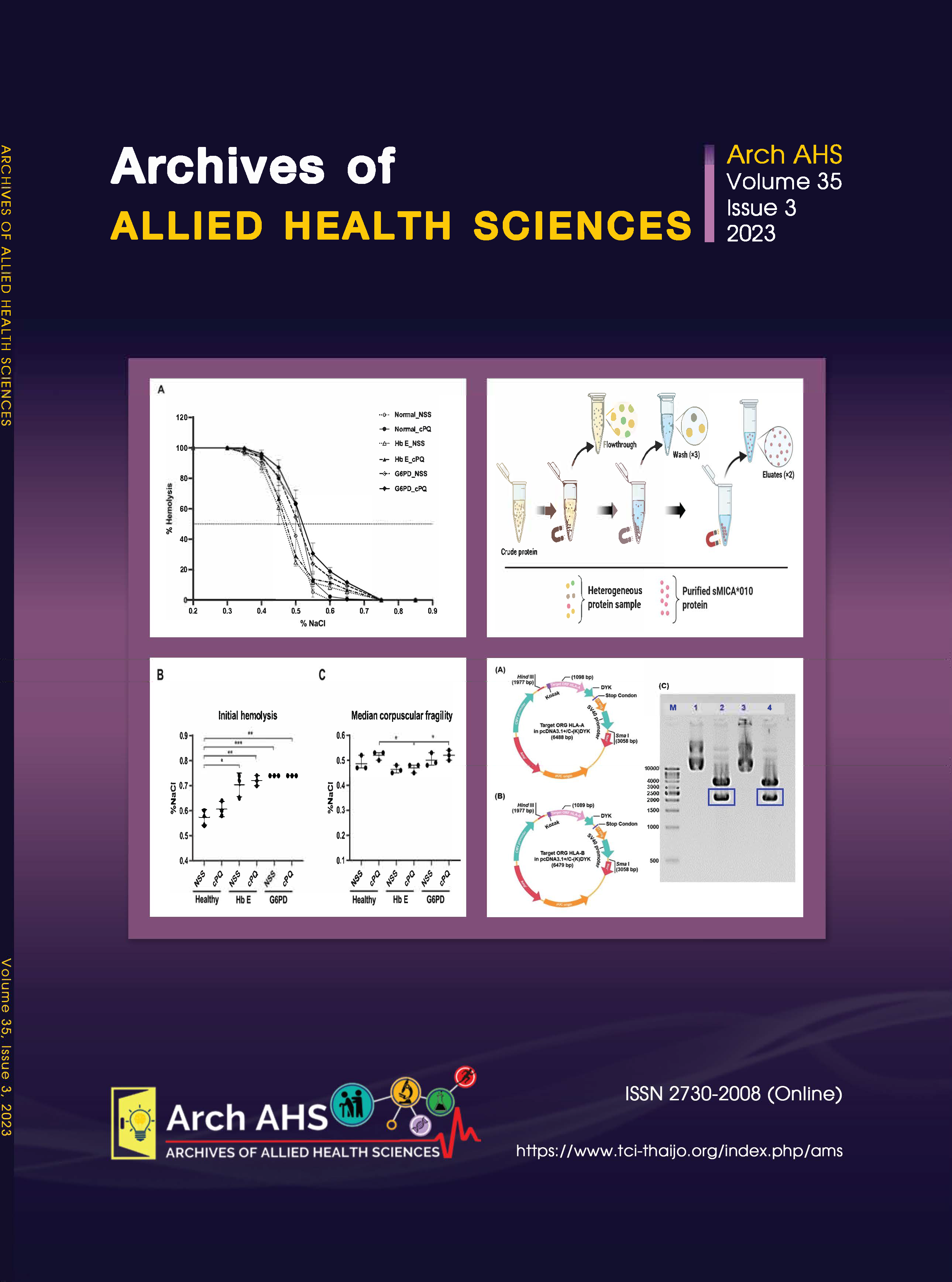Detection of anti-MICA*010 in plasma of kidney transplant patients with pathologically confirmed antibody-mediated rejection
Main Article Content
Abstract
The screening for major histocompatibility complex class I- chain related A (MICA) antibodies in pre- and post-kidney transplantation is crucial to minimize the risk of immunological complications and antibody-mediated kidney rejection (AMR). However, the conventional method for detecting anti-MICA antibodies does not include all relevant MICA, especially MICA*010, a predominant MICA allele in northeastern Thais (NETs). Moreover, a significant number of patients have been diagnosed with AMR despite the absence of detectable antibodies. We hypothesized that anti-MICA*010 might be responsible for rejection in such instances. The household recombinant MICA*010 protein was successfully produced by HEK293 T cells and purified by using a cobalt-based magnetic bead with the percent recovery of 88.994. The ELISA testing using purified MICA*010 proteins was performed on plasma samples from 122 patients who were pathologically confirmed with AMR. Our findings showed that 21 samples (17.21%) in AMR patients exhibited the presence of anti-MICA*010. The flow cytometry showed a concordant result with ELISA. Among these samples with anti-MICA*010, the co-existing anti-HLA antibody was observed in one sample. Furthermore, there were six patients (4.9%) with positive for ELISA were negative for both anti-HLA and other anti-MICA antibodies as identified by Lab Screening Mix (LSM) Luminex test suggesting the importance of anti-MCIA*010 detection. Although further research with the comprehensive evaluation regarding the involvement of anti-MICA*010 in the kidney rejection episode is still needed, the present study is the first to highlight the presence of this antibody, which could offer valuable information for antibody detection in the future.
Article Details

This work is licensed under a Creative Commons Attribution-NonCommercial-NoDerivatives 4.0 International License.
References
Zou Y, Stastny P, Süsal C, Döhler B, Opelz G. Antibodies against MICA antigens and kidney-transplant rejection. N Engl J Med 2007; 357(13): 1293–300.
Zwirner NW, Marcos CY, Mirbaha F, Zou Y, Stastny P. Identification of MICA as a new polymorphic alloantigen recognized by antibodies in sera of organ transplant recipients. Hum Immunol 2000; 61(9): 917–24.
Chen D, Gyllensten U. Review MICA polymorphism : biology and importance in cancer 2014; 35(12): 2633–42.
Luo L, Lu J, Wei L, Long D, Guo JY, Shan J, et al. The role of HIF-1 in up-regulating MICA expression on human renal proximal tubular epithelial cells during hypoxia/reoxygenation. BMC Cell Biol 2010; 11: 91.
Karam G, Kälble T, Alcaraz A, Aki FT, Budde K, Humke U, et al. Guidelines on renal transplantation. Ren Transplant - Eur Assoc Urol 2009; March: 327-37.
Picascia A, Infante T, Napoli C. Luminex and antibody detection in kidney transplantation. Clin Exp Nephrol 2012; 16(3): 373–81.
Li Z, Groh V, Strong RK, Spies T. A single amino acid substitution causes loss of expression of a MICA allele. Immunogenetics 2000; 51(3): 246–8.
Romphruk AV, Naruse TK, Romphruk A, Kawata H, Puapairoj C, Kulski JK, et al. Diversity of MICA (PERB11.1) and HLA haplotypes in Northeastern Thais. Tissue Antigens 2001; 58(2): 83–9.
Suneja M, Kuppachi S. Acute antibody-mediated renal allograft rejection associated with HLA-Cw17 antibody. CKJ Clin Kidney J 2012; 5: 254-6.
Sellares J, Reeve J, Loupy A, Mengel M, Sis B, Skene A, et al. Molecular diagnosis of antibody-mediated rejection in human kidney transplants. Am J Transplant 2013; 13: 971–83.
Irure J, López-Hoyos M, Rodrigo E, Gómez-Román J, Ruiz JC, Arias M, et al. Antibody-Mediated Rejection in Kidney Transplantation Without Evidence of Anti-HLA Antibodies? Transplant Proc 2016; 48: 2888-90.
Jumnainsong A, Romphruk AV, Jearanaikoon P, Klumkrathok K, Romphruk A, Luanrattanakorn S, et al. Association of polymorphic extracellular domains of MICA with cervical cancer in northeastern Thai population. Tissue Antigens 2007; 69(4): 326–33.
Romphruk AV, Romphruk A, Choonhakarn C, Puapairoj C, Inoko H, Leelayuwat C. Major histocompatibility complex class I chain-related gene A in Thai psoriasis patients: MICA association as a part of human leukocyte antigen-B-Cw haplotypes. Tissue Antigens 2004; 63(6): 547–54.
Risti M, Bicalho M da G. MICA and NKG2D: Is there an impact on kidney transplant outcome?. Front Immunol 2017; 8: 1–21.
Álvarez-Márquez A, Aguilera I, Gentil MA, Caro JL, Bernal G, Alonso JF, et al. Donor-specific antibodies against HLA, MICA, and GSTT1 in patients with allograft rejection and C4d deposition in renal biopsies. Transplantation 2009; 87(1): 94–9.
Porath J, Carlsson J, Olsson I, Belfrage G. Metal chelate affinity chromatography, a new approach to protein fractionation. Nature 1975; 258(5536): 598–9.
Porath J. Immobilized metal ion affinity chromatography. Protein Expr Purif 1992; 3(4): 263–81.
Sánchez-Zapardiel E, Castro-Panete MJ, Mancebo E, Morales P, Laguna-Goya R, Morales JM, et al. Early renal graft function deterioration in recipients with preformed anti-MICA antibodies: Partial contribution of complement-dependent cytotoxicity. Nephrol Dial Transplant 2016; 31(1): 150–60.
Hong CH, Sohn HJ, Lee HJ, Cho HI, Kim TG. Antigen presentation by individually transferred HLA class i genes in HLA-A, HLA-B, HLA-C null human cell line generated using the multiplex CRISPR-Cas9 system. J Immunother 2017; 40(6): 201–10.
Jeon JH, Baek IC, Hong CH, Park KH, Lee H, Oh EJ, et al. Establishment of HLA class I and MICA/B null HEK-293T panel expressing single MICA alleles to detect anti-MICA antibodies. Sci Rep 2021; 11(1): 1–12.


